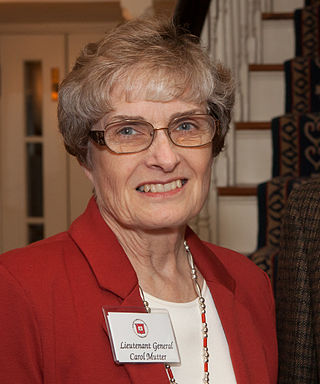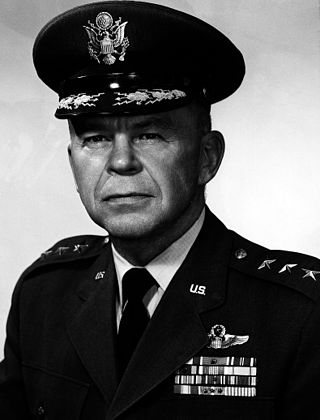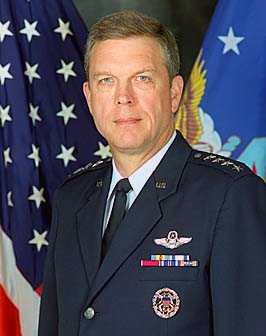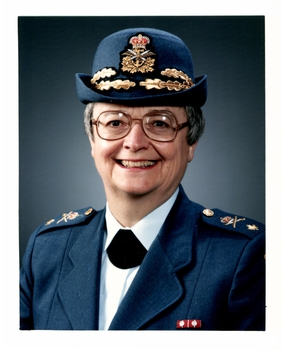Related Research Articles

Jacqueline Cochran was an American pilot and business executive. She pioneered women's aviation as one of the most prominent racing pilots of her generation. She set numerous records and was the first woman to break the sound barrier on 18 May 1953. Cochran was the wartime head of the Women Airforce Service Pilots (WASP) (1943–1944), which employed about 1000 civilian American women in a non-combat role to ferry planes from factories to port cities. Cochran was later a sponsor of the Mercury 13 women astronaut program.

Susan Jane Helms is a retired United States Air Force lieutenant general and NASA astronaut. She was the commander, 14th Air Force ; and commander, Joint Functional Component Command for Space at Vandenberg Air Force Base in California.

General Raymond Roland Joseph Henault, is a retired Canadian Air Force officer. He was the Chief of the Defence Staff of Canada from June 28, 2001. On November 7, 2004, Henault was voted to become the next chairman of NATO's military committee, a position he held until 2008, when he retired.

Joseph William Ashy, is a retired United States Air Force (USAF) general who was commander in chief of North American Aerospace Defense Command and United States Space Command, and commander of Air Force Space Command, headquartered at Peterson Air Force Base, Colorado. As commander of NORAD, General Ashy was responsible for the air sovereignty of the United States and Canada, as well as for providing tactical warning and attack assessment. As USCINCSPACE, he commanded the unified command responsible for directing space control and support operations including theater missile defense. As COMAFSPC, he directed satellite control, warning, space launch and ballistic missile operations missions through a worldwide network of support facilities and bases.

Carol A. Mutter is a retired United States Marine Corps lieutenant general. She is one of the first women in the history of the United States Armed Forces to be appointed to a three-star grade, the first in the Marine Corps. She retired from the Marine Corps on January 1, 1999. Her last active duty assignment was as Deputy Chief of Staff, Manpower and Reserve Affairs at Marine Corps Headquarters in Washington, D.C.
Harris B. Hull was a brigadier general in the United States Air Force, and part of the original staff of the Eighth Air Force during the Second World War.

This article is about women in warfare and the military (2000–present) throughout the world outside the United States. For women in warfare and the military in the United States since 2000, please see: Timeline of women in warfare and the military in the United States, 2000–2010 and Timeline of women in warfare and the military in the United States from 2011–present.

Lieutenant General James Elbert Briggs was a United States Air Force general who was the second Superintendent of the United States Air Force Academy.

Patrick K. Gamble is a retired president of the University of Alaska and a retired United States Air Force (USAF) general whose assignments included service as Commander, Pacific Air Forces, Hickam Air Force Base, Hawaii.

Lori Jean Robinson is a retired United States Air Force general who served as commander of the United States Northern Command (USNORTHCOM) and commander of the North American Aerospace Defense Command (NORAD) from May 2016 to May 2018. She was the first female officer in the history of the United States Armed Forces to command a major Unified Combatant Command.

Eugene Emil Habiger was a United States Air Force four-star general who served as Commander in Chief, United States Strategic Command (USCINCSTRAT) from 1996 to 1998. After retiring from the military on August 1, 1998, he served as Director of Security and Emergency Operations, U.S. Department of Energy, from 1999 to 2001.
Hispanics in the United States Air Force can trace their tradition of service back to the United States Army Air Forces (USAAF), the military aviation arm of the United States Army during and immediately after World War II. The USAAF was the predecessor of the United States Air Force, which was formed as a separate branch of the military on September 18, 1947, under the National Security Act of 1947. In the U.S., the term Hispanic categorizes any citizen or resident of the United States, of any racial background, of any country, and of any religion, who has at least one ancestor from the people of Spain or is of non-Hispanic origin but has an ancestor from Mexico, Puerto Rico, Cuba, Central or South America, or some other Hispanic origin. The three largest Hispanic groups in the United States are the Mexican-Americans, Puerto Ricans, and Cubans. According to the U.S. Census Bureau the estimated Hispanic population of the United States is over 50 million, or 16% of the U.S. population, and Hispanics are the nation's largest ethnic minority. The 2010 U.S. census estimate of over 50 million Hispanics in the U.S. does not include the 3.9 million residents of Puerto Rico, thereby making the people of Hispanic origin the nation's largest ethnic or race minority as of July 1, 2005.

Wilma L. Vaught is a retired U.S. Air Force brigadier general. She was the first woman to deploy with an Air Force bomber unit, and the first woman to reach the rank of brigadier general from the comptroller field.

Alvin Roubal Luedecke was a United States Army Air Forces general during World War II. He commanded the Armed Forces Special Weapons Project after the war. After retiring from the Air Force in 1958, he was General Manager of the United States Atomic Energy Commission, Deputy Director of the Jet Propulsion Laboratory and acting President of Texas A&M University from March 30, 1970, to November 1, 1970.

Women in the Pakistan Armed Forces are the female officers who serve in the Pakistan Armed Forces. Women have been taking part in Pakistani military since 1947, after the establishment of Pakistan. In 2006, the first women fighter pilot batch joined the combat aerial mission command of PAF. The Pakistan Navy prohibits women from serving in the combat branch. Rather, they are appointed and serve in operations involving military logistics, staff and senior administrative offices, particularly in the regional and central headquarters. There was a rise in the number of women applying for the combat branch of PAF in 2013.

Tiiu Kera is a retired United States Air Force (USAF) major general.

Sheila Anne Hellstrom was a Canadian Forces officer who became the first woman in the regular force to achieve the rank of brigadier-general in 1987, as well as being the first woman to graduate from Canadian Forces College.
Christine Theresa Whitecross, CMM, MSM, CD, is a Canadian retired lieutenant-general. A graduate of Queen's University and the Royal Military College of Canada, she has served in Germany, Bosnia, and Afghanistan. Whitecross has twice been named one of Canada's 100 most-powerful women. She was commandant of the NATO Defense College in Rome.

All branches of the Indian Armed Forces have women in combat roles. Women are allowed in combat services and supervisory roles. The Indian Air Force had 13.09% (2018) and 8.50% (2014) women; the Indian Navy 6% (2018) and 3% (2014); the Indian Army 3.80% (2018) and 3% (2014). As of 2020, three officers have the rank of lieutenant-general or equivalent, all in the Medical Services. In May 2021, 83 women were inducted as Jawans for the first time in the Indian Army, in the Corps of Military Police.
References
- ↑ Canadian Forces in Global Conflict, vol. 3. The Memory Project. p. 6.
- 1 2 Lieutenant Colonel (ret’d) Susan Beharriell, O.M.M., CD. EXCELerate 2021.
- 1 2 Tim Kelly (22 January 2014). King resident retires as highly decorated soldier. YorkRegion.com.
- 1 2 3 4 5 6 7 8 9 10 11 Mark Henderson (Fall 2015). Effecting change – Susan Beharriell. Queen's Alumni Review.
- 1 2 3 Veteran Stories:Susan Beharriell. The Memory Project.
- 1 2 Appointee Biographies. Public Appointments Secretariat.
- ↑ Liz Arnason (24 September 2009). One Guitar Unites Our Country. The Boundary Sentinel.